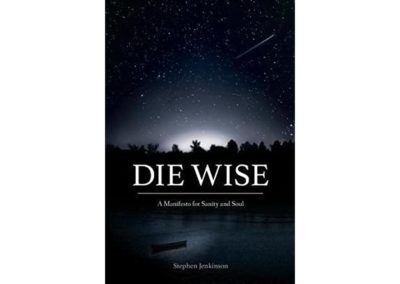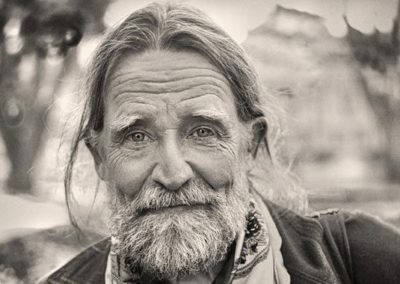Too many books, too little time. So I want to help you get a sense for a foundational text that is worth investing your time in.
Stephen Jenkinson’s “Die Wise“ was first recommended to me by Emily McClatchey, a green funeral steward from Cambridge, MA. I was immediately struck by the beautiful language in the forward from Martin Shaw. You can tell right away that this is a different kind of book.
It took me almost a year to finish “Die Wise” because it took time for my brain to absorb what I was reading. I could only read a few pages at a time. The book has a density to it that isn’t boring, but asks a lot of the reader. But now that it’s over I might just start over because it’s such a pleasure to have it simmering on the back burner of my subconscious.
Below I’ve shared some of my favorite passages from the book. Let’s start with this great book trailer to help you get excited about reading the book and the passages below.
Some of my favorite passages from “Die Wise”:
(P. 13) “Dying wise is a moral obligation. Dying well is not a matter of enlightened self-interest or personal preference. If you can begin to see how dying badly poisons the social, political, professional, and personal discourse about the purpose and meaning of health care and social welfare and being born and dying, if you get a glimpse of how the concentric circles of mayhem and spell casting attending a bad death do not end with that death but actually accelerate and deepen and turn into best practice manuals and family mythologies that have generations of unintended consequence, then you can know each death properly as another chance to die well and to learn the adult mystery of deep living in the face of what often seems to rob life of its depth. Dying well must become an obligation that living people and dying people owe to each other and to those to come.”
Jenkinson caught my attention early in the book with the idea that dying wise is an obligation. Not something aspirational. I like this idea but it took me a long time to figure out exactly what dying wise means. Thankfully I feel he did get there, but this isn’t a dummies guide with chapter summaries and key takeaways. You have to work for it.
(P. 17) “No matter how old you are the first few times you come across the sleek monotlith that is modern medicine in an urban center, you will probably feel as though you come from somewhere very early in the century before last. You might feel like a bumpkin just fallen from the back of the turnip truck, a hapless immigrant from the old country washed up onto the shore of a stainless steel land, carrying your uncertain health in a satchel dangled from a stick. Surely you will feel small and insubstantial in your blue gown and your paper slippers, and you will wonder where you were while all this became your “health care system.”
This hilariously evocative language drew up a feeling that I completely related to. It’s an example of how Jenkinson calls out the absurdity of so many common everyday situations. These were my favorte sort of moments from the book.
(P. 62) “We know without wanting to know it that knowing we could be dying somehow begins our dying.“
As someone interested in death, I haven’t yet formed a philosophy on when it’s ok to start conversations about it. I aspire to confidently engage people in the conversations they need to have, but don’t feel skilled enough to do so. That’s what makes Jenkinson sort of a hero to me – he has the credibility to engage people in direct conversations that I feel comfortable having but not starting.
(P. 99) “When Finding Meaning is your hammer, it turns dying into a desperate kind of scavenger hunt, a last-gasp lunge at holding back the tide of Meaninglessness that our cultural poverty on this issue prescribes to us in our dying time.”
Dying is a lot of work we are obligated to do. So I appreciate when Jenkinson identifies the superfluous and unnecessary work. I’m glad to be relieved of the burden of finding meaning in my death.
(P. 115) “That is the great labor of the thing, to let your life be changed utterly by the news of our death when all and everything around you is counseling steady as she goes, business as usual, as normal a life as possible under the circumstances.”
Jenkinson talks a lot about the consequences of talking about ‘fighting’ death and labeling people as a ‘fighter’. Developing an adversarial relationship with death tees up exhaustion and failure. That energy could be better used to do the work of dying.
(P. 132) “Hope is a mortgage. It is not like a mortgage: It is a mortgage. Hope is a mortgaging of the present, for the sake of some possible future that might come to pass and just as likely might not… In a death-phobic culture like our own, knowing you are dying is not as healthy as hoping you aren’t dying while you are.”
Whoa. Who’s anti-hope?!? This made me sit up.
(P.133) “The bargain for More Time is a gamble for More Life, in oncology, in palliative care, in any foxhole. More Life is the reward of More Time, so the hope goes. But More Life at the end of your life is lived in the distrinct, ample, palpable presence of your death…Your More Life, it turns out, includes More Death, a lot More Death than you ever imagined could be in one life.”
Got it. This is the cost of hope. It can mean not living in the present and abdicating or delaying our responsibility just because it’s unpleasant to think about.
(P. 309) “Dying is a time for untying the knots of strength, competence, and familiarity that have bound us to our bodies.”
Not until the last hundred pages do we get something approaching a prescription for dying wise. I admit to being relieved.
(P. 315) “Dying is enormously hard. The labor of it – and it is labor, of the same kind as that which brings life into the world – is relentless, demanding.”
So much of what is said here seems obvious but revelatory. Just naming the thing (death) deminishes it’s power. Yeah, death is hard.
(P. 371) “Life doesn’t feed on life. Life doesn’t nourish life. Death feds life….Our deaths can, in every sense the word can be meant, feed life – unless we refuse to die, or fight dying, or curse dying, or spend all our dying time not dying.”
This is the thesis behind a great story from one of Jenkins’s workshop exercises where he holds up a plant and asks questions until people recognize that soil is just decayed life.
(P. 378) “Loving and grieving are joined at the hip, for all the beauty, soul, and travail that brings. Grief is a way of loving what has slipped from view. Love is a way of grieving that which has not yet done so. We would do well to say this aloud for many days, to help get it learned: Grief is a way of loving, love is a way of grieving. They need each other in order to be themselves.”
Thank you to Stephen Jenkinson for his book, “Die Wise”. If you read the book and want to talk about it or anything else you can reach me at [email protected].


